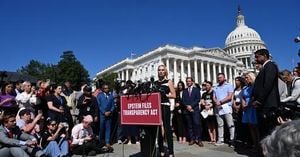Uniqlo, the global fashion brand with deep roots in Japan, is once again at the center of controversy over its sourcing practices, particularly concerning cotton from China’s Xinjiang region. This issue has been intensified following remarks from Fast Retailing's CEO, Tadashi Yanai, stating unequivocally, "We’re not using cotton from Xinjiang." This comment, made during an interview with the BBC, has stirred up significant discourse, especially among consumers and social media users within China.
The Xinjiang region, historically renowned for producing high-quality cotton, has recently become embroiled in allegations of human rights violations, particularly the use of forced labor involving the Muslim Uyghur minority. These claims have been consistently denied by the Chinese government, which has labeled accusations against it as baseless. Yet, the resultant backlash has seen major global retailers—like H&M and Nike—face boycotts from Chinese consumers after they distanced themselves from Xinjiang cotton.
Uniqlo’s position is particularly complex since China serves as both a key market for its products and its primary manufacturing hub. Yanai’s decision to publicly confirm the company’s cotton sourcing strategy marks the first time he has directly addressed this contentious issue, following years of strategic silence aimed at maintaining neutrality between conflicting pressures from the U.S. and China. He acknowledged, “Actually, it gets too political if I say anymore so let's stop here.”
Despite Uniqlo's substantial presence, operating more stores in China than Japan, Yanai persists with his expansion plans, confident there is room to grow from approximately 1,000 stores to 3,000. He previously pointed out, “There are 1.4 billion people in China,” underlining the immense market potential.
Fast Retailing, Uniqlo's parent company, has found itself at the crossroads of social responsibility and profitability, especially as Western scrutiny of human rights issues intensifies. Isaac Stone Fish, CEO of Strategy Risks, shared insights about the growing pressures on large brands, asserting, “Not a single large company can remain politically neutral anymore.” He added, “Both Beijing and Washington want companies to choose sides.” This viewpoint aligns with the struggles of many other global corporations trying to navigate the tricky waters of international politics.
Even as political allegiances shift, Yanai champions Uniqlo's commitment to longevity over the fast fashion model, which he describes as wasteful, indicating his disfavor toward ultra-fast fashion brands like Shein. He stressed, “They’re producing clothes without any careful consideration which you only wear for one season.” This philosophy centers on sustainable fashion practices, appealing to eco-conscious shoppers wary of the environmental impact of disposable clothing.
Since 2022, the U.S. has enforced strict regulations on imports from Xinjiang, affecting global supply chains and prompting many large retail companies to rethink their sourcing strategies. Amidst the tumult, Uniqlo has carved its space by ensuring its cotton does not come from Xinjiang, attempting to placate both the U.S. market and its Chinese customer base. Yanai clarified during the interview, “We have been trying to clear things up,” reflecting the company's intent to be transparent about its manufacturing and material sourcing processes.
This approach is somewhat of a balancing act. On one hand, it seeks to align with global initiatives emphasizing ethical business practices; on the other, it risks alienation from Chinese consumers who might view any distancing from Xinjiang products as offensive. Notably, Uniqlo’s muted response to accusations and its attempts at neutrality helped it successfully operate within China for years.
Overall, it remains to be seen how Uniqlo's latest declarations will affect its brand image, particularly within the Chinese market, as consumer sentiment heavily sways with the political climate surrounding these issues. The stakes are high, considering the company's past experiences with backlash and boycotts stemming from political statements—an occurrence they are eager to avoid as they push for growth.
With millions of potential customers at stake, the road to maintaining both ethical production and commercial success is corrugated, requiring informed strategies and careful handling of sensitive political issues. While the integrity of sourcing practices is under scrutiny, the fashion industry as a whole is watching closely, ready to learn from Uniqlo's pathway through turbulent waters.



